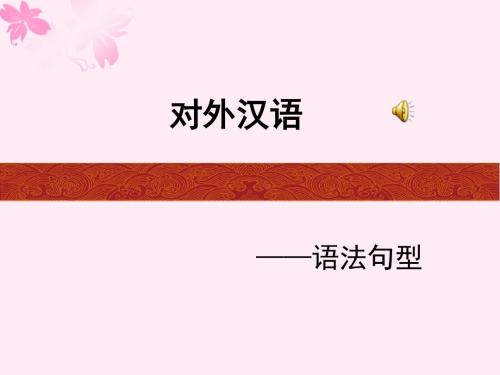常用的对外汉语语法用语中英对照
- 格式:docx
- 大小:13.76 KB
- 文档页数:1

Talking about Time 谈论时间1. What time is it now? 现在几点?2. It's two o'clock. 现在两点。
3. It's a quarter past five. 现在是五点一刻。
4. It's ten minutes to four. 现在差十分四点。
5. It's half past nine. 现在是九点半。
6. It's one o'clock sharp. 现在一点整。
7. It's not four o'clock. 还没到四点呢。
8. My watch says two o'clock. 我的表是两点钟。
9. My watch is two minutes fast. 我的表快了两分钟。
10. What's the time by your watch? 你的表几点了?11. We must arrive there on time. 我们必须准时到那儿。
12. There are only two minutes left. 只剩两分钟了。
13. Can you finish your work ahead of time? 你能提前完成工作吗?14. The flight is delayed. 飞机晚点起飞。
15. The meeting is put off. 会议延期了。
Talking about Visits 谈论拜访1. Hello. Can I see Mr. Green? 你好,我能见格林先生吗?2. Do you have an appointment? 你有预约吗?3. Sorry, I don't. 对不起,我没有。
4. Yes. At 3 pm. 是的,约的是下午3点。
5. Sorry, Mr. Green can't see you now. 对不起,格林先生现在不能见您。

英汉直译汉语对话和常用型总结全文共四篇示例,供读者参考第一篇示例:英汉直译是一种翻译方法,通过直接将英语句子逐字翻译成中文句子,来表达原文的意思。
这种方法通常适用于初学者或需要快速翻译的场合。
下面将提供一份关于英汉直译汉语对话和常用型总结的文章,帮助大家更好地理解这种翻译方法。
一、英-汉直译汉语对话1. A: Hello, how are you?直译:你好,你好吗?B: I'm fine, thanks. And you?直译:我很好,谢谢。
你呢?A: I'm good, thanks for asking.直译:我很好,谢谢你问。
二、常用型总结1. 问候Hello, how are you? 你好,你好吗?I'm fine, thanks. And you? 我很好,谢谢。
你呢?2. 询问喜好What's your favorite color? 你喜欢什么颜色?My favorite color is blue. 我喜欢蓝色。
3. 询问来自Where are you from? 你来自哪里?I'm from China. 我来自中国。
4. 职业What do you do for a living? 你是做什么工作的?I'm a teacher. 我是个老师。
5. 语言能力Can you speak any other languages? 你会说其他语言吗?Yes, I can speak French and Spanish. 是的,我会说法语和西班牙语。
通过以上的例句和总结,我们可以看到英汉直译的特点是直接将英语句子逐字翻译成中文句子,虽然有时候不太符合汉语的表达习惯,但可以帮助初学者更快地理解英语句子的意思。
希望大家能够通过这种方法提高自己的英语水平,更好地与外国人交流。
第二篇示例:英汉直译是指将英文对话逐字直译成中文,这种翻译方式可能会导致表达不够自然或者不太符合中文习惯。
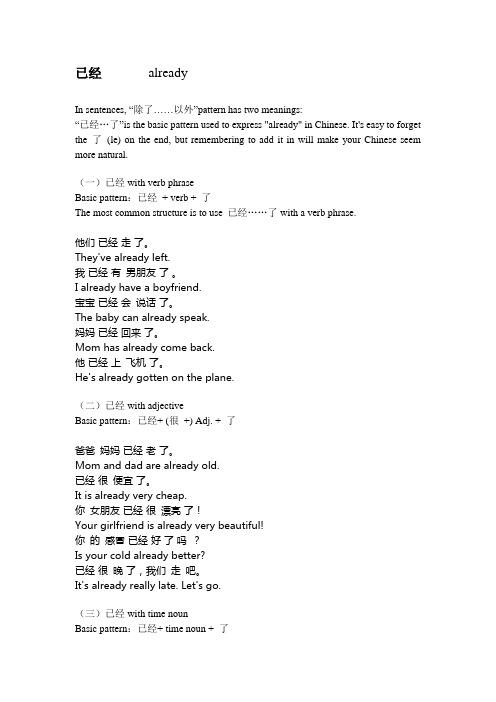
已经alreadyIn sentences, “除了……以外”pattern has two meanings:“已经…了”is the basic pattern used to express "already" in Chinese. It's easy to forget the 了(le) on the end, but remembering to add it in will make your Chinese seem more natural.(一)已经with verb phraseBasic pattern:已经+ verb + 了The most common structure is to use 已经……了with a verb phrase.他们已经走了。
They've already left.我已经有男朋友了。
I already have a boyfriend.宝宝已经会说话了。
The baby can already speak.妈妈已经回来了。
Mom has already come back.他已经上飞机了。
He's already gotten on the plane.(二)已经with adjectiveBasic pattern:已经+ (很+) Adj. + 了爸爸妈妈已经老了。
Mom and dad are already old.已经很便宜了。
It is already very cheap.你女朋友已经很漂亮了!Your girlfriend is already very beautiful!你的感冒已经好了吗?Is your cold already better?已经很晚了,我们走吧。
It's already really late. Let's go.(三)已经with time nounBasic pattern:已经+ time noun + 了已经 11点了,女儿还没回来。
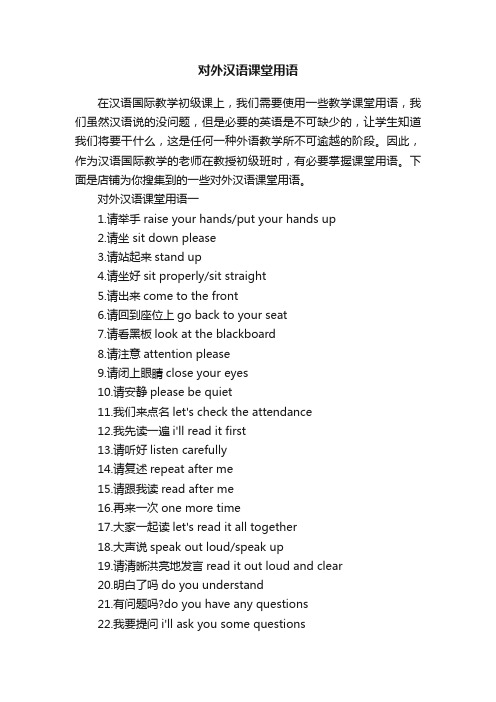
对外汉语课堂用语在汉语国际教学初级课上,我们需要使用一些教学课堂用语,我们虽然汉语说的没问题,但是必要的英语是不可缺少的,让学生知道我们将要干什么,这是任何一种外语教学所不可逾越的阶段。
因此,作为汉语国际教学的老师在教授初级班时,有必要掌握课堂用语。
下面是店铺为你搜集到的一些对外汉语课堂用语。
对外汉语课堂用语一1.请举手raise your hands/put your hands up2.请坐 sit down please3.请站起来stand up4.请坐好sit properly/sit straight5.请出来come to the front6.请回到座位上go back to your seat7.请看黑板look at the blackboard8.请注意attention please9.请闭上眼睛close your eyes10.请安静please be quiet11.我们来点名let's check the attendance12.我先读一遍i'll read it first13.请听好listen carefully14.请复述repeat after me15.请跟我读read after me16.再来一次one more time17.大家一起读let's read it all together18.大声说speak out loud/speak up19.请清晰洪亮地发言read it out loud and clear20.明白了吗do you understand21.有问题吗?do you have any questions22.我要提问i'll ask you some questions23.请回答问题please answer the questions24.你能来回答一下吗can you answer it25.你说什么what did you say26.你能再说一遍吗could you say it again27.给大家发补充材料i'll give you a handout28.请传给后座同学please pass it to the person behind you29.请在补充材料上写上名字write your name on your handout30.请传给我bring it to me31.请翻到第15页open your books to page1532.请翻到下一页turn to the next page33.请合上书close your books34.请记到笔记本上write it on your notebook35.请到黑板上写一下come and write it on the blackboard36.请在下面画横线underline it37.请找伙伴please get in pairs38.请做练习题do the exercise39.请与同伴一起做练习practice with your partners40.请与同伴交流talk with your partners41.都做完了吗have you finished42.我们来复习上节课的内容let's review the last lesson43.上节课我们做什么了what did we do last time44.让我们来对答案let's check the answers45.我来布置作业i'll give you some homework46.不要忘了做作业don't forget to do your homework47.我要检查作业i'll check your homework now48.请使用汉语please speak in chinese49.那个用汉语怎么说what is it in chinese50.让我们来进行下一个活动let's go on to the next activity51.今天就到这里that's all for today。
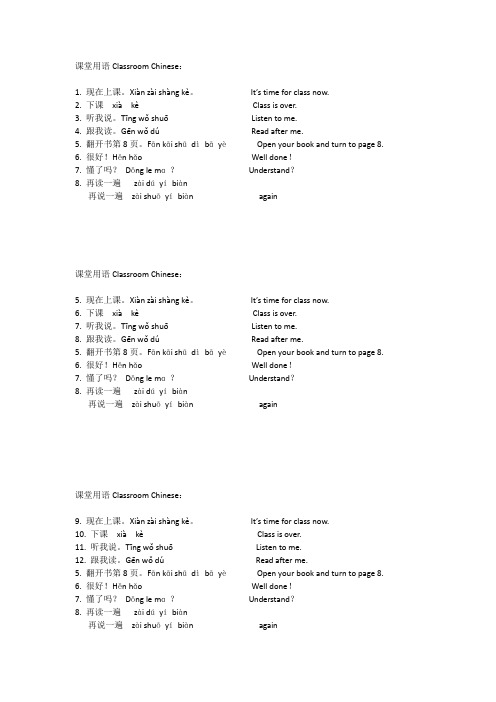
课堂用语Classroom Chinese:1. 现在上课。
Xiàn zài shàng kè。
It’s time for class now.2. 下课xià kè Class is over.3. 听我说。
Tīng wǒ shuōListen to me.4. 跟我读。
Gēn wǒ dúRead after me.5. 翻开书第8页。
Fān kāi shūdìbāyèOpen your book and turn to page 8.6. 很好!Hěn hǎo Well done!7. 懂了吗?Dǒng le mɑ?Understand?8. 再读一遍zài dúyíbiàn再说一遍zài shuōyíbiàn again课堂用语Classroom Chinese:5. 现在上课。
Xiàn zài shàng kè。
It’s time for class now.6. 下课xià kè Class is over.7. 听我说。
Tīng wǒ shuōListen to me.8. 跟我读。
Gēn wǒ dúRead after me.5. 翻开书第8页。
Fān kāi shūdìbāyèOpen your book and turn to page 8.6. 很好!Hěn hǎo Well done!7. 懂了吗?Dǒng le mɑ?Understand?8. 再读一遍zài dúyíbiàn再说一遍zài shuōyíbiàn again课堂用语Classroom Chinese:9. 现在上课。
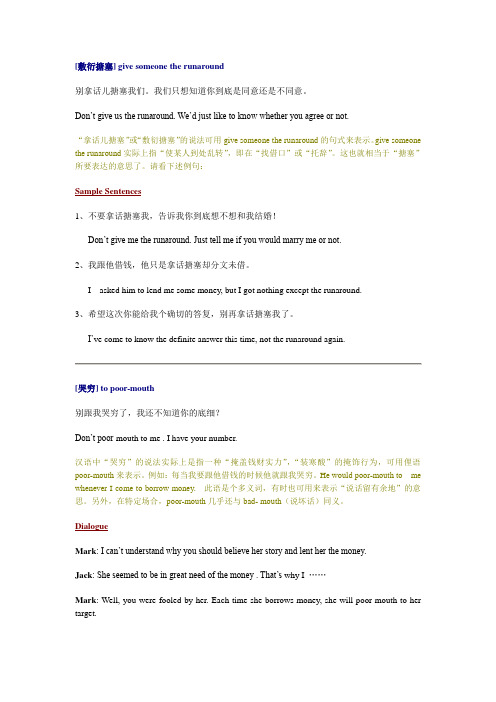
[敷衍搪塞] give someone the runaround别拿话儿搪塞我们。
我们只想知道你到底是同意还是不同意。
Don’t give us the runaround. We’d just like to know whether you agree or not.“拿话儿搪塞”或“敷衍搪塞”的说法可用give someone the runaround的句式来表示。
give someone the runaround实际上指“使某人到处乱转”,即在“找借口”或“托辞”。
这也就相当于“搪塞”所要表达的意思了。
请看下述例句:Sample Sentences1、不要拿话搪塞我,告诉我你到底想不想和我结婚!Don’t give me the runaround. Just tell me if you would marry me or not.2、我跟他借钱,他只是拿话搪塞却分文未借。
I asked him to lend me some money, but I got nothing except the runaround.3、希望这次你能给我个确切的答复,别再拿话搪塞我了。
I’ve come to know the definite answer this time, not the runaround again.[哭穷] to poor-mouth别跟我哭穷了,我还不知道你的底细?Don’t poor-mouth to me . I have your number.汉语中“哭穷”的说法实际上是指一种“掩盖钱财实力”,“装寒酸”的掩饰行为,可用俚语poor-mouth来表示。
例如:每当我要跟他借钱的时候他就跟我哭穷。
He would poor-mouth to me whenever I come to borrow money.此语是个多义词,有时也可用来表示“说话留有余地”的意思。
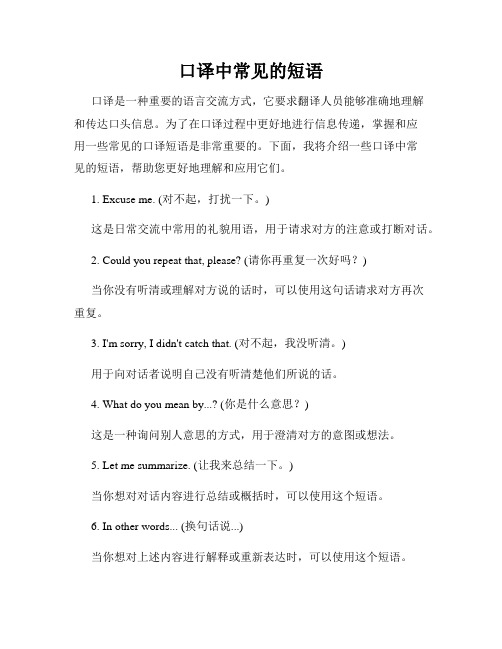
口译中常见的短语口译是一种重要的语言交流方式,它要求翻译人员能够准确地理解和传达口头信息。
为了在口译过程中更好地进行信息传递,掌握和应用一些常见的口译短语是非常重要的。
下面,我将介绍一些口译中常见的短语,帮助您更好地理解和应用它们。
1. Excuse me. (对不起,打扰一下。
)这是日常交流中常用的礼貌用语,用于请求对方的注意或打断对话。
2. Could you repeat that, please? (请你再重复一次好吗?)当你没有听清或理解对方说的话时,可以使用这句话请求对方再次重复。
3. I'm sorry, I didn't catch that. (对不起,我没听清。
)用于向对话者说明自己没有听清楚他们所说的话。
4. What do you mean by...? (你是什么意思?)这是一种询问别人意思的方式,用于澄清对方的意图或想法。
5. Let me summarize. (让我来总结一下。
)当你想对对话内容进行总结或概括时,可以使用这个短语。
6. In other words... (换句话说...)当你想对上述内容进行解释或重新表达时,可以使用这个短语。
7. Please speak slower. (请说得慢一点。
)当对方讲话速度太快,超出你的理解范围时,可以使用这句话请求对方放慢语速。
8. Could you please speak up a bit? (请你稍微大声点说好吗?)用于请求对方说话大一点,方便你听清楚。
9. Sorry, I didn't get that last part. (抱歉,我没有听明白最后一部分。
)表示你没有听清对方说的最后一部分内容。
10. Are you saying that...? (你是在说...吗?)用于确认自己对对方意思的理解是否准确。
11. What did you mean by...? (你的意思是...吗?)用于进一步了解对方对某个观点或信息的解释。
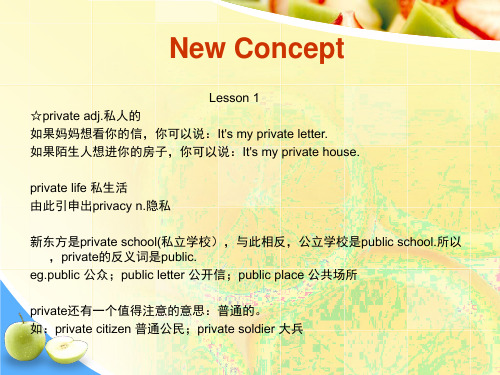

101条日常用语中英文对照1、哪(nǎ)一(yì)天(tiān)都(dōu)可(kě)以(yǐ)?Any day will do?2、有(yǒu)我(wǒ)的(de)留(liú)言(yán)吗(mɑ)?Any messages for me?3、你(nǐ)一(yí)个(ɡè)人(rén)来(lái)吗(mɑ)?Are you by yourself?4、你(nǐ)没(méi)有(yǒu)问(wèn)题(tí)吧(bɑ)?All right with you?5、明(mínɡ)天(tiān)有(yǒu)空(kōnɡ)吗(mɑ)?Are you free tomorrow?6、你(nǐ)在(zài)跟(ɡēn)我(wǒ)开(kāi)玩(wán)笑(xiào)吧(bɑ)?Are you kidding me?7、不见不散。
Be there or be square.8、马(mǎ)上(shànɡ)回(huí)来(lái)!Back in a moment As soon as possible!9、信(xìn)不(bu)信(xìn)由(yóu)你(nǐ)!Believe it or not!10、下(xià)次(cì)会(huì)更(ɡènɡ)好(hǎo)!Better luck next time!11、本(běn)性(xìnɡ)难(nán)移(yí)!Boy will be boys12、有(yǒu)话(huà)直(zhí)说(shuō)!Come to the point!13、收(shōu)不(bu)收(shōu)信(xìn)用(yònɡ)卡(kǎ)?Do you accept plastic?14、可(kě)以(yǐ)保(bǎo)存(cún)吗(mɑ)?Does it keep long?15、别(bié)挑(tiāo)剔(ti)了(le)!Don‘t be so fussy!16、别(bié)指(zhǐ)望(wànɡ)我(wǒ)!Don‘t count to me!17、不(bú)要(yào)上(shànɡ)当(dānɡ)!Don‘t fall for it!18、你(nǐ)搞(ɡǎo)错(cuò)了(le)!Don‘t get me wrong!19、少(shǎo)来(lái)这(zhè)套(tào)!Don‘t give me that!20、别(bié)让(rànɡ)我(wǒ)失(shī)望(wànɡ)!Don‘t let me down!21、别(bié)乐(lè)昏(hūn)了(le)头(tóu)!Don‘t lose your head!22、别(bié)做(zuò)过(ɡuò)头(tóu)了(le)!Don‘t over do it!23、别(bié)闲(xián)着(zhe)做(zuò)白(bái)日(rì)梦(mènɡ)!Don‘t sit there daydreaming!24、别(bié)太(tài)拘(jū)束(shù)!Don‘t stand on ceremony!25、要(yào)写(xiě)信(xìn)给(ɡěi)我(wǒ)!Drop me a line!26、来(lái)得(dé)容(rónɡ)易(yì)去(qù)得(dé)也(yě)快(kuài)!Easy come easy go!27、先(xiān)到(dào)先(xiān)得(dé)!First come first served!28、快(kuài)点(diǎn)吧(bɑ)!Get a move on!29、不(bú)要(yào)嘲(cháo)笑(xiào)我(wǒ)!Get off my back!30、给(ɡěi)他(tā)点(diǎn)教(jiào)训(xùn)!Give him the works!31、饶(ráo)了(le)我(wǒ)吧(bɑ)!Give me a break!32、帮(bānɡ)我(wǒ)一(yí)个(ɡè)忙(mánɡ)!Give me a hand!33、英(yīnɡ)雄(xiónɡ)所(suǒ)见(jiàn)略(luè)同(tónɡ)!Great minds think alike!34、午(wǔ)餐(cān)我(wǒ)请(qǐnɡ)你(nǐ)!I‘ll treat you to lunch.35、一(yì)耳(ěr)进(jìn),一(yì)耳(ěr)出(chū)!In one ear, out the other ear.36、我(wǒ)开(kāi)小(xiǎo)差(chà)了(le)!I‘m spaced-out!37、请(qǐnɡ)你(nǐ)再(zài)说(shuō)一(yī)遍(biàn)!I beg your pardon!38、我(wǒ)付(fù)不(bù)起(qǐ)!I can‘t afford that!39、我(wǒ)不(bù)懂(dǒnɡ)你(nǐ)说(shuō)的(de)!I can‘t follow you!40、我(wǒ)情(qínɡ)不(bú)自(zì)禁(jīn)!I can‘t help it!41、我(wǒ)联(lián)络(luò)不(bú)上(shànɡ)他(tā)!I couldn‘t reach him!42、我(wǒ)发(fā)誓(shì)是(shì)真(zhēn)的(de)!I cross my heart!43、我(wǒ)不(bú)是(shì)故(ɡù)意(yì)的(de)!I don‘t mean it!44、我(wǒ)好(hǎo)沮(jǔ)丧(sànɡ)!I feel very miserable!45、我(wǒ)好(hǎo)沮(jǔ)丧(sànɡ)!I have no choice!46、视(shì)财(cái)如(rú)命(mìnɡ)!I watch my money!47、保(bǎo)持(chí)联(lián)络(luò)!I‘ll be in touch!48、我(wǒ)去(qù)看(kàn)看(kɑn)!I‘ll check it out!49、我(wǒ)带(dài)你(nǐ)四(sì)处(chù)逛(ɡuànɡ)逛(ɡuànɡ)!I‘ll show you around!50、我(wǒ)会(huì)留(liú)意(yì)的(de)!I‘ll see to it!51、我(wǒ)为(wéi)你(nǐ)疯(fēnɡ)狂(kuánɡ)!I‘m crazy for you!52、你(nǐ)下(xià)了(le)我(wǒ)一(yí)跳(tiào)!You make me jump!53、作(zuò)个(ɡè)决(jué)定(dìnɡ)吧(bɑ)!Make up your mind.54、就(jiù)当(dānɡ)在(zài)家(jiā)一(yí)样(yànɡ)!Make yourself at home!55、我(wǒ)要(yào)流(liú)口(kǒu)水(shuǐ)了(le)!My mouth is watering!56、没(méi)听(tīnɡ)说(shuō)过(ɡuò)!Never heard of it!57、很(hěn)高(ɡāo)兴(xìnɡ)和(hé)你(nǐ)聊(liáo)天(tiān)!Nice talking to you!58、勿(wù)庸(yōnɡ)置(zhì)疑(yí)!No doubt about it!59、不(bù)经(jīnɡ)一(yí)事(shì),不(bù)长(chánɡ)一(yí)智(zhì)!No pain no gain!60、要(yào)你(nǐ)管(ɡuǎn)?None of your business!61、这(zhè)没(méi)你(nǐ)的(de)事(shì)!There is nothing on your business!62、说(shuō)得(dé)对(duì)!Now you are really talking!63、请(qǐnɡ)不(bú)要(yào)吹(chuī)促(cù)我(wǒ)!Please don‘t rush me!64、请(qǐnɡ)一(yí)定(dìnɡ)要(yào)通(tōnɡ)知(zhī)我(wǒ)!Please keep me informed!65、她(tā)今(jīn)天(tiān)很(hěn)忧(yōu)郁(yù)!She looks blue today.66、她(tā)心(xīn)情(qínɡ)不(bù)好(hǎo)!She is under the weather.67、过(ɡuò)得(dé)去(qù)So far, so good.。

对外汉语中英语法术语
在对外汉语教学中,了解和掌握一些常用的英语语法术语是非常有必要的,因为这将有助于更好地向外国学生解释汉语的语法结构和规则。
以下是一些常用的英语语法术语及其在汉语中的对应表达:
1. 词类 (Parts of speech):包括名词、动词、形容词、副词、介词、连词等。
2. 主语 (Subject):句子中的主要成分,通常位于句首,表示动作的执行者或状态的表现者。
3. 谓语 (Predicate):句子中的核心成分,表示主语的动作或状态。
4. 宾语 (Object):句子中接受动作或行为的对象。
5. 状语 (Adverbial):修饰动词、形容词或副词的词语,表示时间、地点、方式、程度等。
6. 定语 (Adjective):修饰名词的词语,通常用来描述名词的性质或特征。
7. 补语 (Complement):补充说明主语或宾语的词语,通常表示动作的结果或状态的性质。
8. 语气 (Mood):表示说话者的语气或态度,包括陈述语气、祈使语气、虚拟语气等。
9. 时态 (Tense):表示动作发生的时间,包括现在时、过去时、将来时等。
10. 语态 (Voice):表示动作的方式,包括主动语态和被动语态。
以上只是一些基本的英语语法术语,实际上还有很多更具体和专业的术语,如分词、不定式、从句等等。
在对外汉语教学中,教师需要根据学生的实际需求和学习水平,选择适当的术语进行解释和教学。

汉语平时会话150 句汉(h àn) 语(y ǔ) 日(r ì) 常(ch áng) 会(hu ì) 话(hu à)150 句(j ù)150Sentences for Chinese Daily Communication你(n ǐ) 好(h ǎo) ! Hello再(z ài) 见(ji àn) ! Goodbye谢(xi è) 谢(xi è) ! Thanks不(b ú) 客(k è) 气(q ì) ! You’re welcome!对(du ì) 不 (bu) 起(q ǐ) ! I am sorry没(méi) 关(gu ān) 系 (xi) !Don’t mention it.1. 问(wèn) 候(h òu) 和(h é) 自(z ì) 我(wǒ) 介(ji è) 绍(sh ào)Greetings and Self-Introduction(1) 你好 (n ǐhǎo) !Hello!(2) 我叫桑德兰 (wǒji àosāngdél án) 。
My name is Sandra.(3) 你是哪国人 (n ǐshìnǎguór én) ? What’s your nationality?(4) 我是奥地利人 (wǒshìà odìl ìr é n) 。
I am Austrian.(5)我不是大学生 (wǒbúshìdàxuéshēng) 。
I am not a university student.(6)我不会说汉语 (wǒbúhuìshuōhànyǔ) 。

常用语(汉英)(一)、官方场合常用语1、会见您好。
How are you!初次见面问好。
How do you do!很高兴见到你。
(It's) nice to meet you.请问您从哪来。
Where are you from?请问贵姓。
Can I have your name?我叫...。
My name is ... (I'm ...)很高兴认识你。
It was a pleasure meeting you.希望再见到你。
Hope to see you again.2、宴请尊敬的朋友们Distinguished/Honorable/Respected friends请入席 Please have a seat.欢聚一堂 enjoy this happy get-together请随便 Please yourself at home./Please enjoy yourself.请各位随意用餐 Help yourself please.您喝点什么? What would you like to drink?现在我提议,为了…和…之间的合作,为了…参议员的健康,干杯!At this point, I propose a toast: to the cooperation between … and … , to the health of Senator…, cheers!请各位举杯并同我一起为所有在座的朋友们的健康干杯!I’d ask you to raise your glass and join me in a toast on the health of all our friends present here.敬您一杯。
Here’s to you.祝你健康 To your health.我要为此干杯 I’ll drink to that!随量 Whatever you like.我失陪一会儿 Excuse me for a minute.招待会现在开始。
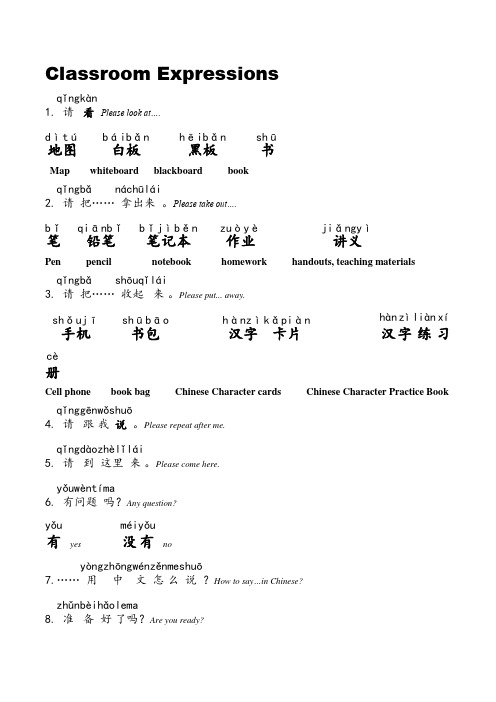
Classroom Expressions1.请qǐng 看kànPlease look at….地图d ìt ú 白板b áib ǎn 黑板h ēib ǎn 书sh ūMap whiteboard blackboard book 2.请qǐng 把bǎ……拿出来náchūlái。
Please take out….笔b ǐ 铅笔qi ānb ǐ 笔记本b ǐj ìb ěn 作业zu òy è 讲义ji ǎngy ìPen pencil notebook homework handouts, teaching materials 3.请qǐng 把bǎ……收起shōuqǐ来lái。
Please put... away.手机sh ǒuj ī 书包sh ūb āo 汉字h ànz ì卡片k ǎpi àn 汉hàn 字zì练liàn 习xí册câCell phone book bag Chinese Character cards Chinese Character Practice Book 4.请qǐng 跟gēn 我wǒ说shuō。
Please repeat after me.5.请qǐng 到dào 这里zhâlǐ来lái。
Please come here.6.有问题yǒuwântí吗ma?Any question?有yǒu yes 没mãi 有yǒuno7.……用yîng 中zhōng 文wãn 怎zěn 么me 说shuō?How to say …in Chinese?8.准zhǔn 备bâi 好hǎo 了le 吗ma?Are you ready?准zhǔn 备bâi 好hǎo 了le I ’m ready! 没mãi 准zhǔn 备bâi 好hǎoNot ready yet.9.懂dǒng 了le 吗ma?Do you understand?懂dǒng 了le yes(I understand) 不bù懂dǒngno (I don ’t understand) 10.听tīng 懂dǒng 了le 吗ma?Can you understand what you hear?听tīng 懂dǒng 了leYes (I can understand what I hear).没mãi 听tīng 懂dǒngNo (I can’t understand what I hear).11.谢谢xiâxiâ!不客气búkâqì。
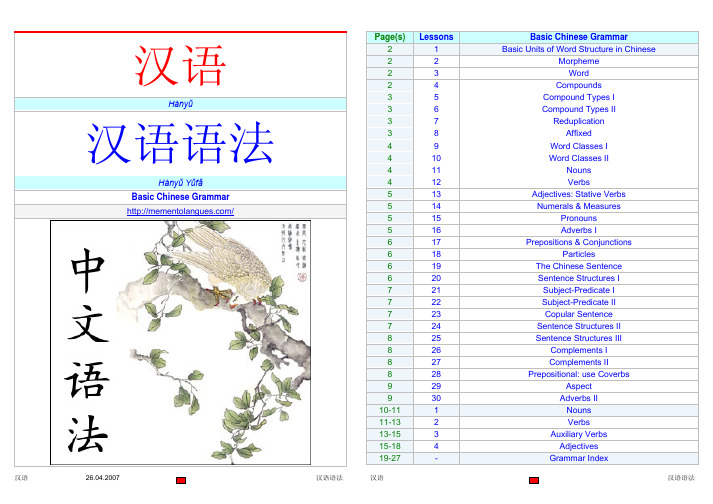
汉语Hànyǔ汉语语法Hànyǔ YǔfǎBasic Chinese Grammar/ Page(s) Lessons Basic Chinese Grammar2 1 Basic Units of Word Structure in Chinese2 2 Morpheme2 3 Word2 4 Compounds3 5 Compound Types I3 6 Compound Types II3 7 Reduplication3 8 Affixed4 9 Word Classes I4 10 Word Classes II4 11 Nouns4 12 Verbs5 13 Adjectives: Stative Verbs5 14 Numerals & Measures5 15 Pronouns5 16 Adverbs I6 17 Prepositions & Conjunctions6 18 Particles6 19 The Chinese Sentence6 20 Sentence Structures I7 21 Subject-Predicate I7 22 Subject-Predicate II7 23 Copular Sentence7 24 Sentence Structures II8 25 Sentence Structures III8 26 Complements I8 27 Complements II8 28 Prepositional: use Coverbs9 29 Aspect9 30 Adverbs II10-11 1 Nouns11-13 2 Verbs13-15 3 Auxiliary Verbs15-18 4 Adjectives19-27 - Grammar IndexA Review in SlidesAuthor: Richard VanNess Simmons/~rsimmon/chingram/书写纸ShūxiězhǐLe bloc-notes中文上网学习Zhōngwén shàng wǎng xuéxíLearning Chinese On the Net/course/grammar/list.phpChinese Grammar课Kè Lesson 标题Biāotí TitleOne 名词MíngcíNounsTwo 动词DòngcíVerbsThree 助动词ZhùdòngcíAuxiliary VerbsFour 形容词Xíngróngcí Adjectives第一课:名词Dì yī kè: MíngcíLesson One: NounsA word denoting the name of a person or a thing is called a noun. Generally a noun can be preceded by a numeral-measure word combination, but can't be modified by adverbs. Some monosyllabic nouns can be reduplicated to express the meaning of "every". For example, "人人" rénrén (everyone), "天天" tiāntiān (everyday) and so on. The suffix "们" men can be added to a personal noun to express the plural. For example, "老师们" lǎoshīmen (teachers). However, if before the noun there are numeral-measure words or other words implying the plural, the suffix "们" men can't be added to the noun. For example, we can't say "五个老师们" wǔ ge lǎoshīmen, but should say "五个老师" wǔ ge lǎoshī (five teachers).Generally a noun can serve as a subject, an object or an attributive in a sentence.1.作主语。

词汇Vocabulary目录 Contents主题Topic 页Page 1 个人 The individual 22 教育与职业 Education and work163 商业区与服务 Town and services254 饮食 Food and drink295 休闲和娱乐 Leisure and travel346 环境 The environment427 健康与紧急情况 Health and emergencies458 其他 Other 48Topic 1主题 一、 个人 gèrén The individual 一、 个人情况与住址gèrén qíngkuàng yǔ zhùzhǐOrder Word POS PinyinEnglish1 姓名 n. xìngmíng family name and given name2 性别 n. xìngbié gendar3 年龄 n. niánlíng age4 出生 v. chūshēng be born5 日期 n. rìqī date6 地点 n. dìdiǎn place, site.7 国籍 n. guójí nationality8 职业 n. zhíyè occupation, profession9 工作单位 n.gōngzuò dānwèi place of work10 住址 n. zhùzhǐ address.11 国 n. guó a country12 省 n. shěng province13 市 n. shì city14 区 n. qūarea, region, zone, district15 街 n. jiē street16 路 n. lù road17 号 n. hào number in a series18 胡同 n. hútòng lane, alley, bystreet.19 城市 n. chéngshì city.20 郊区 n. jiāoqū suburban21 农村 n. nóngcūn rural area, countryside.22 县 n. xiàn county.23 乡 n. xiāng township of rural24 村 n. cūn village二、人群组别groupsRénqun zǔbiéOrder Word POS Pinyin English1 大家n. dàjiāall people, everybody.2 男人n. nánrén men, menfolk.3 女人n. nǚrén woman.4 小孩儿n xiǎoháir child, little child.5 大人n. dàren adult.6 青年n. qīngnián youth, young people.7 年轻人n. niánqīngrén young people, youth.8 中年人n. zhōngniánrén people of in middle age9 老年人n. lǎoniánrén old people, the aged.10 南方人n. nánfāngrén Southerner,people from south part of a country11 北方人n. běifāngrén Northerner,people from north part of a country12 东方人n. dōngfāngrén Oriental, Eastern person13 西方人n. xīfāngrén Western person14 外国人n. wàiguórén foreigner15 朋友n. péngyou friend16 同学n. tóngxuéschoolmate17 同事n. tóngshìcolleague, cowork18 亲戚n. qīnqīrelative19 病人n. bìngrén patients,sick person.20* 亚洲n. Yàzhōu Asia, Asian.21 中国n. ZhōngguóChina22* 日本n. rìběn Japan23* 韩国n. hánguóSouth Korea24* 新加坡n. xīnjiāpōSingapore25* 泰国n. tàiguóThailand26* 马来西亚n. MǎláixīyàMalaysia27* 菲律宾n. Fēilǜbīn Philippines28* 以色列n. yǐsèlièIsrael.29* 美洲n. měizhōu the America.30 美国n. MěiguóUnited States of America, USA. 31* 加拿大n. jiānádàCanada32* 智利n. zhìlìChile33* 阿根廷n. A1gēntíng Argentina.34* 巴西n. BāxīBrazil.35* 欧洲n. Oūzhōu Europe, Europen.36 英国n. YīngguóEngland, Britain,U.K.37 法国n. FǎguóFrance38* 挪威n. Nuówēi Norway39* 丹麦n. Dānmài Denmark40* 芬兰n. fēnlán Fenland41* 荷兰n. hélán Holland.42* 西班牙n. XībānyáSpain.43* 意大利n. YìdàlìItaly44* 瑞典n. Ruìdiǎn Sweden.45* 非洲n. Fēizhōu Africa.46* 南非n. nánfēi South Africa.47* 澳洲n. Aòzhōu Australia48* 澳大利亚n. AòdàlìyàAustralia49* 新西兰n. xīnxīlán New Zealand三、家庭jiātíng family, household.Order Word POS Pinyin English1家庭n. jiātíng family2父亲n. fùqin father3母亲n. mǔqīn mather4爸爸n. bàba dad, pa5妈妈n. māma mamma, ma, mum.6哥哥n. gēge elder brother7姐姐n. jiějie elder sister, older sister.8弟弟n. dìdi younger brother9妹妹n. mèimei younger sister.10*兄弟姐妹n.xiōngdìjiěmèi siblings11爷爷n. yéye grandpa,respectfully address for an elderly man.12奶奶n. nǎinai grandma;respectfully address for an elderly woman. 13伯伯n. bóbo uncle, father's elder brother.14叔叔n. shūshu father's younger brother,uncle.15姑姑n. gūgu father's sister, aunt.16*堂哥n. tánggēolder male cousin of a same surname. 17*堂姐n. tángjiěolder female cousin of a same surname. 18外公n. wàigōng maternal grandfather.19姥爷n. lǎoye maternal grandpa20外婆n. wàipómaternal grandmother.21姥姥n. lǎolao maternal grandma.22舅舅n. jiùjiu mother's brother, maternal uncle.23姨n. yímother's sister, aunt.24*表弟n. biǎodìyounger male cousin of a differentsurname.25*表妹n. biǎomèi younger female cousin with a differentsurname.26孩子n. háizi child27儿子n. érzi son28女儿n. nǚér daughter29丈夫n. zhàngfu husband30妻子n. qīzi wife31先生n. xiānsheng one's husband, Mr.32太太n. tàitai wife, Mrs, ,Madam.33生曰n. shēngyuēbirthday34结婚v.o. jiéhūn marry, get married.35* 离婚v.o. líhūn divorce四、问候 wènhòu greetingOrder Word POS Pinyin English1 问候v./ n. wènhòu send one's regards to, greeting.2 你好intj. nǐhǎo How are you?, Hello.3 再见v. zàijiàn goodbye, bye-bye4 谢谢v. xièxie thanks, thank you.5 不用谢ph bùyòngxiè not at all, you are welcome.6 不客气ph bùkèqì you are welcome, not at all.7 别客气ph biékèqì you are welcome, not at all.8 对不起ph duìbùqǐI'm sorry, sorry, excuse me9 没关系ph méiguānxi It doesn't matter, never mind.10 打扰v. dǎrǎo disturb11 打扰一下intj dǎrǎoyīxiàexcuse me, can you help me…12 请问v. qǐngwèn excuse me, may I ask…13 贵姓Q. guìxìng (what is) your surname?14 名字n. míngzi name or given name.15 叫v. jiào name, call16 什么pr. Q shénme what17 多大Q duōdàhow old19* 属v. shǔany of the twelve animals symbolizingthe year in which one is born20 身体n. shēntǐbody21 最近n. zuìjìn recently22 好吗Q hǎoma How are you?25 一般adj. yībān so-so. general,26 怎么样Q zěnmeyàng how about, what about.27 不错adj. bùcuònot bad, pretty good.28 还可以ph huáikěyǐOk, Yes. pretty good.29 介绍v., n. jièshào introduce; introduction.30 认识v.,n. rènshi know, be acquainted with (a person),recognize31 一下儿m yíxiàr (Measure for action)32 介绍一下ph jièshào yīxià Let’ s introduce ourselves33 认识一下ph rènshí yīxià Let’s get to know each other34 欢迎v./ n. huānyíng welcome, greet, favorably35 祝贺v.,n. zhùhècongratulate; congratulation.五、相貌Xiàngmào AppearanceOrder Word POS Pinyin English1 外貌n. wàigmào (of a person) facial features, looks.appearance2 和conj. héand3 性格n. xìnggéCharacterstic, temperament4 高adj.,n. gāo tall, high.5 矮adj. ǎi short (not tall); low6 胖adj. pàng (of human body) fat7 瘦adj. shòu thin8 白adj. bái white9 黑adj. hēi black10 黄adj. huáng yellow11 皮肤n. pífūskin12 个子n. gèzi height13 头m(n) tóu head, chief, boss14 头发n. tóufa hair (on the head).15 脸n. liǎn face16 眼睛n. yǎnjing eye,17 嘴n. zuǐmouth18 鼻子n. bízi nose,19 耳朵n. ěrduo ear.20 眉毛n. méimao eyebrow, brow.21 脖子n. bózi neck.22 胳膊n. gēbo arm.23 腰n. yāo waist24 腿n. tuǐleg25 手n. shǒu hand; a person doing or good at acertain job26 脚n. jiǎo foot27 体重n. tǐzhòng (body) weight28 长adj. cháng (space or time)long29 短adj. duǎn short, brief(space, time ,etc.)30 大adj. dàbig, great, old31 小adj. xiǎo small, little.32 粗adj. cūwide (in diameter ), thick33 细adj. xìthickness, narrow thin34 圆adj. yuán round35 方adj. fāng square36 漂亮 adj. piàoliang beautiful, pretty37* 帅adj. shuài handsome,六、衣着yīzhuóClothingOrder Word POS Pinyin English1 衣着n. yīzhuóclothing2 穿v. chuān wear, put on, be dressed in3 衣服n. yīfu clothing, clothes4 大衣n. dàyīovercoat5 衬衫n. chènshān shirt, blouse.6 西装n. xīzhuāng Western-style clothes.7 休闲装v. xiūxiánzhuāng leisure attire8 T恤衫n. Txùshān T-shirt9 雨衣n. yǔyīraincoat.10 裤子n. kùzi trousers, pants.11 裙子n. qúnzǐskirt.12 袜子n. wàzi socks, stockings.13 鞋n. xiéshoe.14 皮鞋n. píxiéleather shoes.15 运动鞋n. yùndòngxiésports shoes16 运动服n yùndòngfútrack suit17 戴v. dài wear sth. on the head, face,neck, chest,arm, hands etc18 帽子n. màozi hat, cap.19 手套n. shǒutào gloves.20 打v. dǎtie up.21 领带n. lǐngdài necktie, tie.22 围v. wéi enclose,encircle23 围巾n. wéijīn muffler, scarf.七、性格 xìnggé characterOrder Word POS Pinyin English1 友好adj. yǒuhǎo friendly2 热情adj. rèqíng enthusiastic, passionate3 文静adj. wénjìng gentle and quiet.4 认真adj. rènzhēn earnest, careful5 性子n. xìngzi temper6 急性子attr. jíxìngzi quick--tempered, an impetuous person.7 慢性attr. mànxìngzi slow-tempered.8 亲切adj. qīnqièkind, enthusiastic and caring.9 健谈adj. jiàntán be good at casual conversation10 礼貌n lǐmào courtesy, politeness11 有礼貌 s.v yǒulǐmào polite12 粗鲁adj. cūlǔrude, impolite.八、情感与感觉qínggǎn yǔ gǎnjué feelingsOrder Word POS Pinyin1 情感n. qínggǎn emotion, feeling.2 与conj. yǔand, with3 感觉v.,n. gǎnjuésense, feel, sensation.4 高兴adj. gāoxìng glad, happy.5 快乐s.v./ n. kuàilèhappy, joyful, cheerful.6 愉快adj. yúkuài happy, joyful, pleasant.7 生气v.o./s.v. shēngqìget angry8 伤心adj.,v.o. shāngxīn sad, broken-hearted.9 担心v.o./s.v. dānxīn worry, be worry oneself about.10 难过adj. nánguòfeel sorry, feel bad.11 痛苦adj.,n. tòngkǔpain, suffering.12 满意s.v./ v. mǎnyìsatisfied, be satisfied, to one'ssatisfaction13 激动adj. jīdòng be excited14 紧张adj. jǐnzhāng nervous, tense.15 放心v.o. fàngxīn set one's mind at rest, feel relieved ;trust sb16 苦恼adj. kǔnǎo distressed, worried, pitful.17 笑v. xiào smile, laugh.18 哭v. kūcry, weep.19 累adj. lèi tired20 饿adj. è be hungry21 渴adj. kěthirsty22 饱adj. bǎo have eaten one's fill, eat till full九、住房 zhùfáng housingOrder Word POS Pinyin English1 家n.,m(n), jiāfamily,;home; specialist, used in 艺术家yishùjiā2 住房n. zhùfáng housing,3 房子n. fángzi house, building.4 楼n./m. lóu storied building5 公寓n. gōngyùapartment6 别墅n. biéshùvilla7 房东n. fángdōng landlord or landlady, owner of a houseor room8 房客fángkètenant(of a house or a room)9 出租v. chūzūrent out10 房租n. fángzūrent11 租房v.o zūfáng rent a house12 房屋n. fángwūhouses, buildings.13 搬家v.o. bānjiāmove (house).14 搬到v bāndào move to15 房间n. fángjiān room.16 客厅n. kètīng sitting room, living room.17 书房n. shūfáng study. ( a room)18 卧室n. wòshìbedroom, bedchamber.19 睡房n.shuìfáng bedroom20 厨房n. chúfáng kitchen, cookroom21 餐厅n. cāntīng dining-hall, dining-room22 饭厅n.fàntīng dining-room, dining-hall.23 洗澡间n.xǐzǎojiān bath-room24 浴室n. yùshìbathroom, public bathhouse.25 卫生间n.wèishēngjiān rest-room ,toilet26 洗手间n.xǐshǒujiān rest-room ,toilet27 厕所n. cèsuǒtoilet, W.C; rest room28 阳台n. yángtái balcony29 车库n.chēkùgarage30 花园n. huāyuán garden31 楼梯n. lóutīstairs33 楼下n.lóuxiàdownstairs34 墙n. qiáng wall.35 窗户n. chuānghu window, casement.36 门n.,m(n) mén door, gate; measure word for courses37 大门n. dàmén gate, (house, yard or park)38 门口n. ménkǒu entrance, doorway, gate.39 花n. huāflower, blossom, bloom40 草n. cǎo grass, straw.41 树n., shùtree;plant.42 家具n. jiāju furniture43 床n. chuáng bed44 沙发n. shāfāsofa, couch45 餐桌n. cānzhuōdining table.46 书桌n. shūzhuōdesk, writing desk.47 椅子n. yǐzi chair.48 茶几n. chájītea table, side table.49 地毯n. dìtǎn carpet, rug50 家用电器n.p. jiāyòngdiànqìelectrical home appliances.51 电视n. diànshìtelevision, TV52 电冰箱n. diànbīngxiāng refrigerator, fridge.53 微波炉n.wēibōlúmicrowave54 洗衣机n. xǐyījīwashing machine55 吸尘器n.xīchénqìvacuum56 舒适adj. shūshìcomfortable, cosy.57 宽敞adj. kuānchang spacious58 干净adj. gānjìng clean, neat and tidy59 邻里n. línlǐneighborhood60 邻居n. línjūneighbor, neighborhood.61 吵闹v. chǎonào noisy十、起居qǐjū daily lifeOrder Word POS Pinyin English1 起居n. qǐjūdaily life2 起床v.o. qǐchuáng get up3 吃饭v.o. chīfàn eat a meal4 喝茶v.o. hèchádrink tea5 刷牙v.o. shuāyábrush teeth6 洗脸v.o. xǐliǎn wash face7 洗澡v.o. xǐzǎo have or take a bath, take a shower.8 上厕所v.o shàngcèsuǒgo to the toilet9 方便adj. fāngbiàn convenient. Go10 睡觉v.o. shuìjiào go to bed, go to sleep11 休息v./ n. xiūxi have (or take) a rest.12 理发v.o. lǐfàhave a haircut13 上班v.o. shàngbān go to work, start work.14 下班v.o. xiàbān knock off, get off work.15 上学v.o. shàngxuégo to school, attend school.16 放学v.o. fàngxuéfinish classes (for the day of a school)17 迟到v. chídào arrive late, be late.18 准时adj. zhǔnshíBe punctual, on time,19 请假v.o. qǐngjiàask for leave.20 运动v.,n. yùndòng exercises, campaign21 锻炼v./ n. duànliàn engage in physical exercise.22 玩儿v. wánr play, play with23 有时候v.o. yǒushíhòu sometimes, now and then.24 星期一n. xīngqīyīMonday.25 星期天n. xīngqītiān Sunday.26 星期日n. xīngqīrìSunday.27 每天n.měitiān every day29 经常adv. jīngcháng frequently, constantly,often30 常常adv. chángcháng frequently, usually, often.十、家务jiāwù house workOrder Word POS Pinyin English1 买菜v.o.mǎicài buy vegetable2 洗衣v.o.xǐyīwash clothes3 摆v. bǎi put, place, arrange.4 桌子n. zhuōzi table, desk.5 照顾v./ n. zhàogùlook after, care for.6 做饭v.o. zuòfàn prepare a meal.7 熨衣服v.o.yùnyīfúiron clothes8 帮忙v.o. bāngmáng help, do a favor.9 打扫v. dǎsǎo clean, sweep, bream.10 洗碗v.o.xǐwǎn wash dishes, wash bowls11 清洁adj. qīngjiéclean十一、迎客yíngkèEntertainingOrder Word POS Pinyin English1 迎客yíngkèwelcome the guest2 请客v.o. qǐngkèplay the host, invite to dinner.3 作客v.o. zuòkèbe a guest.4 来v.,b.f., lái come, arrive.5 去v.,b.f qù go, leave6 看v. kàn see, look at, watch; read; visit.7 串门inf. chuànmén drop in8 送行v. sòngxíng see sb. off9 迎接v. yíngjiēmeet, welcome.10 接v.,n. jiēmeet, pick up sb from( school or airportetc.)11 送v. sòng deliver, carry; give as a present,see sb. off.12 客人n. kèren visitor, guest; traveling13 贺卡n. hèkǎcongratulation cards, greeting card.14 信n. xìn letter, mail15 条子n. tiáozi brief informal note, a short note16 出去v(c) chūqùgo out, get out17 有空yǒukòng free18 有事v. yǒushìbe occupied or busy.19 开v. kāi hold a (meeting/etc.)20 晚会n. wǎnhuìevening party, soiree.21 聚会v. jùhuìparty, (of people) get together.22 跟prep. gēn with, to, from, towards23 见面v.o. jiànmiàn meet, see.24 跟…见面gēn…jiànmiàn meet somebodyTopic 2主题二、教育与职业Education and work 一、学校、学生与教师xuéxiào xuéshēng yǔ jiàoshīSchools, Students and TeachersOrder Word POS Pinyin English1教育v.,n. jiàoyùteach, educate, education2教师n. jiàoshīteacher, instructor.3私立sīlìprivately run.4 公立gōnglìpublic, be established and maintained bythe government.5学费n. xuéfèi tuition fee, tuition;6学校n. xuéxiào school7年级n. niánjígrade (in school, etc. ).8 班n. bān class, a group of students who studytogether9组n. zǔgroup10幼儿园n. yòuéryuán kindergarten, nursery school.11小学n. xiǎoxuéprimary school.12中学n. zhōngxuémiddle school and high school13初中n. chūzhōng middle school.14高中n. gāozhōng high school.15大学n. dàxuéuniversity16学院n. xuéyuàn college17男生n. nánshēng Schoolboy, boy student18女生n. nǚshēng girl student19小学生n. xiǎoxuéshēng (primary school)pupil,20中学生n. zhōngxuéshēng middle-school and high-school student.21大学生n. dàxuéshēng college or university student22老师n. lǎoshīteacher23班主任n. bān zhǔ rèn homeroom teacher24校长n. xiàozhǎng headmaster, principal.25家长n. jiāzhǎng parent or guardian of a child.二、学校设施xuéxiào shèshī school facilities Order Word POS Pinyin English1 设施n. shèshīfacilities.2 校园n. xiàoyuán campus3 教室n. jiàoshìclassroom, schoolroom.4 课桌n.kèzhuōdesk in class5 写字v.o. xiězìwrite (characters).6 板n. bǎn board, plank, sheet, flat.7 会议室n. huìyìshìmeeting/conference room.8 实验室n. shíyànshìlab, laboratory.9 图书馆n. túshūguǎn library, atheneum.10 教学楼n.jiàoxuélóu teaching building11 食堂n. shítáng cafeteria12 礼堂n. lǐtáng assembly hall,theater13 布告栏n.bùgàolán bulletin board14 宿舍n. sùshèdormitory.15 操场n. cāochǎng playground, sports field.16 体育馆n. tǐyùguǎn gym, stadium.17 游泳池n. yóuyǒngchíswimming pool.18 场n. chǎng field.19 篮球场n. lánqiúchǎng basketball court20 足球场n. zúqiúcháng soccer field三、文具wénjù Office SuppliesOrder Word POS Pinyin English1 文具 n. wénjùstationery2 课本 n. kèběn textbook3 笔 n. bǐpen, pencil, writing brush.4 毛笔 n. máobǐwriting brush5 文具盒 wénjùhépencil box7 本 n. běn note book8 刀子 n. dāozi knife9 尺子 n. chǐzi ruler.10 作业本 n.zuòyèběn homework exercise book11 橡皮 n. xiàngpírubber, eraser.12 墨水 n. mòshuǐink13 字典 n. zìdiǎn dictionary.14 词典 n. cídiǎn dictionary15 计算机 n. jìsuànjīcomputer.16 计算器 n. jìsuànqìcalculator17 复印机 n.fùyìnjīprint machine18 地图 n. dìtúmap19 电脑 n. diànnǎo computer.20 录音机 n. lùyīnjī(tape) recording machine四、计算机jìsuànqì computer.Order Word POS Pinyin English1 开机v.o. kāijīturn on a machine2 关机v.o.guānjīturn off a mechine3 上网v.o. shàngwǎng be on the internet4 因特网n.yīntèwǎng internet5 电子邮件n. diànzǐyóujiàn email6 传真v.,n. chuánzhēn fax7 下载v. xiàzài download.8 打印v.,v.o. dǎyìn print9 软件n. ruǎnjiàn computer software,personnel credentials10 存盘v.o.cúnpán save in a disc11 硬件n. yìngjiàn hardware, mechanical equipment12 文件n. wénjiàn Official documents,file.13 鼠标器n.shǔbiāoqìmouse of a computer五、教学活动jiàoxuéhuódòng teaching activities Order Word POS Pinyin English1 教学活动jiàoxuéhuódòng teaching activities2 科目n. kēmùschool subject or course,3 汉语n. hànyǔChinese language4 数学n. shùxuémathematics5 物理n. wùlǐphysics6 化学n. huàxuéchemistry.7 生物n. shēngwùbiology8 体育n. tǐyùP.E.9 音乐n. yīnyuèmusic.10 美术n. měishùart; painting.11 艺术n.,adj. yìshùart12 历史n. lìshǐhistory13 地理n. dìlǐgeogr a phy14 政治n. zhèngzhìpolitics15 外语n. wàiyǔforeign language.16 计算机科学n.jìsuànjīkēxuécomputer science17 社会学n. shèhuìxuésociology.18 天文学n. tiānwénxuéastronomy19 经济n.,adj. jīngjìeconomy20 法律n. fǎlǜlaw21 工程n. gōngchéng project, engineering.22 心理学n. xīnlǐxuépsychology.23 环境科学n. huánjìngkēxuéenvironment science24 医学n. yīxuémedical science25 活动v.,n. huódòng activity, events.26 课堂活动n. kètáng huódòng classroom activities.27 提问28 回答n.,v. huídáreply, answer, response.29 点名v.o. diǎnmíng name a person (to do sth.) ,roll call.30 讨论v.,n. tǎolùn discuss, discussion.31 小组n. xiǎozǔsmall group.32 解释v.,n. jiěshìexplain;explanation.33 练习v.,n. liànxípractice, practise,34 字n.,v. zìword, character.35 句子n. jùzǐsentence36 段落n. duànluòparagraph37 听v., tīng listen, hear.38 说v., shuōspeak, say.39 读v. dúread (aloud)40 写v.,char. xiěwrite41 完成v. wánchéng accomplish, complete.42 作业n. zuòyèschool assignment or work.43 考试n.,v. kǎoshìexamination, test, exam.44 优秀adj. yōuxiùoutstanding, excellent.45 及格adj. jígépass, pass a test, examination, etc.46 补考v.o.bǔkǎo make-up an examination47 复习v./ n. fùxíreview, revise.48 辅导v.,n. fǔdǎo tutor.49 进步v.,n. jìnbùprogress, improve;improvement.50 取得v. qǔdéget, achieve, gain, obtain.51 成绩n. chéngjīperformance, result, score,achievement.52 懂v. dǒng understand, know.53 知识n. zhīshi knowledge54 知道v. zhīdao know, realise55 注意v./n. zhùyìpay attention to有用57 有趣adj. yǒuqùinteresting, fascinating.58 无聊adj. wúliáo boring59 容易adj. róngyìeasy;easily.60 难adj. nán difficult, hard.六、课外活动kèwài huódòng after school activitiesOrder Word POS Pinyin English1 课外n.kèwài extracurricular, after school.2 社会实践n.shèhuìshíjiàn field trip.3 服务v.,n.fúwùservice, serving.4 实习v./ n.shíxípractice, do fieldwork.5 参加v.cānjiāparticipate, to take part, partacipation.6 课外活动小组kèwài huódòng xiǎozǔsmall groups of after schoolactivities七、学校安排xuéxiào ānpái School activitiesOrder Word POS Pinyin English1 安排v.,n. ānpái arrange, plan.3 上课v.o. shàngkèattend class, go to class.4 下课v.o. xiàkèget out of class, finish class.5 午休n.wǔxiūlunch break6 放假v.o. fàngjiàhave or be on a holiday or vacation.7 开学v.o. kāixuéstart school, begin a term, school opens.8 寒假n. hánjiàwinter vacation.9 暑假n. shǔjiàsummer vacation,summer break.10 学期n. xuéqīterm, semester.11 假期n. jiàqīvacation, holiday.12 期中n. qīzhōng in the middle of a term13 期末n. qīmòat the end of a term14 运动会n. yùndònghuìsports meet, track field15 夏令营n. xiàlìngyíng summer camp.16 游览v./ n. yóulǎn go sight-seeing, tour.17 开会v.o. kāihuìhold or attend a meeting, have a meeting.八、有关词汇yǒuguān cíhuì relevant vocabularyOrder Word POS Pinyin English1 有关v. yǒuguān relevant2 词汇n. cíhuìvocabulary3 认为v. rènwéi think, consider.4 总之conj. zǒngzhīin a word, in short.5 反对v. fǎnduìoppose, be against, object.6 相反adj.,adv. xiāngfǎn opposite, contrary, reverse.7 同意v./ n. tóngyìagree8 道理n. dàoli truth, principle9 第一num. dìyīfirst10 第二num. dìèr the second11 一方面conj. yīfāngmiàn on one side.12 另一方面 f.e. lìngyīfāngmiàn on the other hand.九、未来打算 wèilái dǎsuan-学习xuéxíFuture Plans - Studies Order Word POS Pinyin English1 未来n. wèilái future2 打算v.,n. dǎsuan plan, intend,intention,3 学习v.,n. xuéxílearn, study.4 注册v. n. zhùcèregister, enroll in an organisation,institute or school.5 文凭n. wénpíng diploma.6 文科n. wénkēliberal arts7 理科n. lǐkēscience course in a college8 工科n.gōngkēengineering course in a college9 医科n.yīkēmedical course in a college10 师范n. shīfàn teacher-training major in a college11 系n.,v. xìdepartment (in a college, university),12 毕业v.o. bìyègraduate13 学位n. xuéwèi academic degree14 学士n. xuéshìbachelor, bachelor's degree15 硕士n. shuòshìMaster , M.A.16 博士n. bóshìdoctor, the highest of the academicdegrees;17 研究v.,n. yánjiūstudy, research十、职业 zhíyè job, occupationOrder Word POS Pinyin English1 工作v.,n. gōngzuòwork ;job; task.2 退休v.o. tuìxiūretire, retirement.3 公务员n. gōngwùyuán government employee.4 工程师n. gōngchéngshīengineer.5 艺术家n. yìshùjiāartist, longhair.6 医生n. yīshēng doctor7 大夫n. dàifu doctor8 护士n. hùshi nurse.9 自由职业zìyóuzhíyèliberal professions10 律师n. lǜshīlawyer11 会计n. kuàijìaccounting, accountant.12 教授n.,v. jiàoshòu professor13 科学家n. kēxuéjiāscientist14 画家n. huàjiāpainter, artist.15 记者n. jìzhějournalist, reporter16 作家n. zuòjiāwriter, author.17 经理n.,v. jīnglǐmanager,18 商人n. shāngrén businessman19 演员n. yǎnyuán performer, actor, actress.20 工人n. gōngrén worker, laborer21 警察n. jǐngchápolice, policeman,22 农民n. nóngmín farmer, peasant,23 职员n. zhíyuán office staff24 秘书 n. m ìsh ū secretary, 25 服务员 n. f úw ùyu án waiter,waitress, service person 26 翻译 v.,n. f āny ì translate, interpreter. translator, interpreter.十一、找工作 zh ǎo g ōngzu ò looking for a job Order Word POS Pinyin English 1 找 v. zh ǎo look for 2 申请 v.,n. sh ēnq ǐng apply for, application (form, etc.).3 简历 n. ji ǎnl ì resume4 登 v. d ēng publish, climb( a hill, mountain)5 广告 n. gu ǎngg ào advertise, advertisement6 联系 v.,n. li ánx ì get in touch with; contact7 收入 n.,v. sh ōur ù income, earnings,8 全职 n. qu ánzh í full-time job9 兼职 n.,v.o. ji ānzh í Part-time job 10 工资 n. g ōngz ī wages, pay, salary. 11 失业 v.o. sh īy è lose one's job, be unemployed,12 机会 n. j īhu ì opportunity, chance. 13 努力 s.v./ n. n ǔl ì make efforts, try hard 14 计划 n.,v. j ìhu à plan; make a plan. 15 实现 v. sh íxi àn achieve, fulfil 16 希望 v.,n. x īw àng hope 17 当 v.,prep., d āng act as, serve as, become 18 老板 n. l ǎob ǎn boss 19 如果 conj. r úgu ǒ if 20 准备 v.,n. zh ǔnb èi prepare, get ready; 21 能够 aux. n éngg òu can, be able to, 22 成功 v.,adj.,n. ch éngg ōng succeed, achieve, success.Topic 3主题三 、 商业区与服务 Commerce and services一、商店种类 sh āngdi àn zh ǒngl èi types of stores Order Word Pinyin English 1 商业区 n. sh āngy èq ū downtown,shopping mall. 2 购物 v./ n. g òuw ù go shopping, shopping 3 商店 n. sh āngdi àn store, shop. 4 种类 n. zh ǒngl èi kind, sort, type, variety, category. 5 购物中心 n.p. g òuw ùzh ōngx īn shopping center or mall. 6 百货商店 n. b ǎihu òsh āngdi àn department store 7 超级市场 n. ch āoj ísh ìch áng supermarket. 8 农贸 市场 n óngm àosh ìch áng agricultural market fair 9 友谊商店 n. y ǒuy ìsh āngdi àn Friendship store 10 日用品 n. r ìy òngp ǐn articles for daily use, daily-use necessities.11 理发店 n. l ǐf àdi àn barber shop 12 书店 n. sh ūdi àn bookstore, bookshop.二、商店内 sh āngdi àn n èi in the storeOrder Word POS Pinyin English 1 内 n.,b.f. nèi in, inside, inner, internal. 2 部 n.,v.,m(n) bù part, section.3 服装 n. fúzhu āng dress, clothes, costume.4 帽 n. mào hat, cap.5 化妆品 n. huàzhu āngp ǐn makeup, cosmetics.6 箱 b.f.,m(n) xi āng box, trunk.7 包 v.,n.,m(n) b āo bag8 柜台 n. guìtái counter 9 试衣室 n. shìy īshì space for trying clothes 10 试穿 shìchu ān try to wear。

